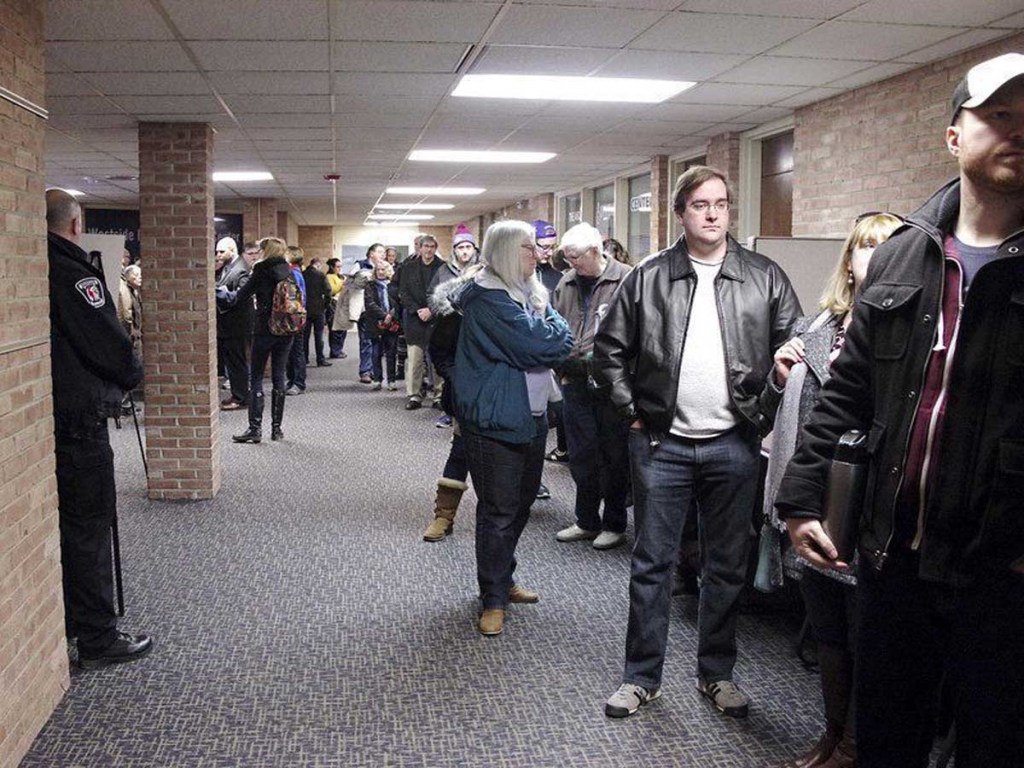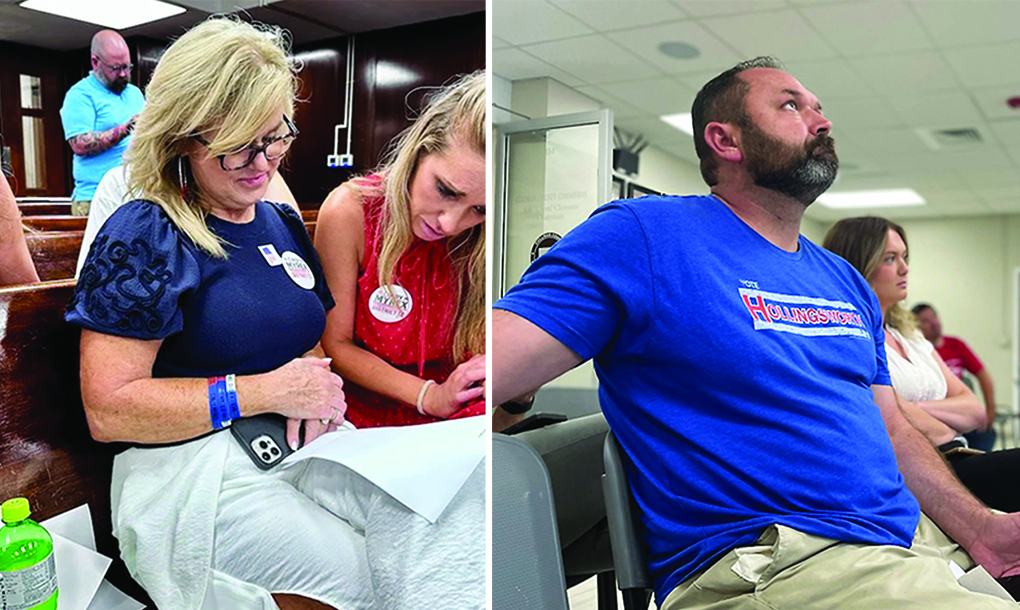Members of Congress on recess encounter harsh questioning at local town hall events
Published 2:40 pm Wednesday, February 22, 2017

- A crowd of people wait in Anderson, Ind., during U.S. Representative Susan Brooks's recent "Connect With Your Congresswoman" event.
Against a backdrop of a new administration that spent much of its first month engaged in a war of words with the media and trying to tamp down controversy, members of Congress spent a week-long recess hearing from angry constituents and defending the format of some of the meetings organized to hear citizens’ concerns.
In Iowa, Sen. Joni Ernst, considered by some to be a rising star in the Republican Party, encountered harsh criticism during a pair of stops in rural towns.
Trending
Amid a day of contentious town hall style meetings between legislators and constituents across the state, Ernst stopped at Mercy Medical Center North in Clinton, Iowa for a closed meeting with local advocates seeking to curb substance abuse.
The stop in Clinton came after Ernst was berated by protesters at a forum in nearby Maquoketa, where the Republican senator received harsh criticism from opponents. In Maquoketa, Ernst spoke before more than 100 people, who raised issues ranging from climate change to health care.
The forum lasted only about 45 minutes.
“The crowd tried to remain respectful of those veterans that actually attended to get their information to us, but there were others that were just so angry,” Ernst told the Clinton, Iowa Herald. “It didn’t matter what the discussion was, they weren’t going to pay attention.”
Since Trump’s election, reports have spread of an overload of constituents attempting to contact their senators and representatives in the midst of some of his controversial actions, including an executive order banning travel to the United States by citizens of seven Muslim-majority countries.
Ernst says many of the messages, either phone voicemails or emails, have followed the same pattern.
Trending
“What we’ve seen since the election has just been, ‘Get in there and work,'” Ernst said. “That’s what we’re doing. I don’t think there is anything surprising necessarily that has happened since the election. What we’ve seen is a president that has transitioned into the administration, and he’s doing everything that he said he would do when he was out on the campaign trail. People shouldn’t be surprised at his actions…We’re trying to move in the direction that (our constituents) asked us to move in, in this last election.”
Angry constituents confront Chuck Grassley in Iowa: “If it wasn’t for Obamacare, we wouldn’t be able to afford insurance!” pic.twitter.com/vrbhbOiBMM
— Bradd Jaffy (@BraddJaffy) February 21, 2017
In Indiana, at least two members of the state’s congressional delegation declined to hold town hall meetings for constituents during visits to their districts. U.S. Rep. Trey Hollingsworth told the Jeffersonville News and Tribune that he prefers speaking with residents in individual meetings, which he said are a better environment for constructive discussions.
“The focus is on having meaningful, individual dialogue with Hoosiers rather than ramping up the volume, because I think what a lot of people don’t like about D.C. is the screaming and talking at each other instead of the talking collectively about how we get a better outcome,” Hollingsworth said during an interview at the News and Tribune’s Jeffersonville office.
Hollingsworth would rather go “narrower but deeper” when answering to Southern Indiana residents because complex policy issues can’t be properly explored through 30-second answers, he said.
“If we get to the point where we’ve had so many meetings and there’s just no time to accommodate all those meetings, maybe we’ll try to take the pool wider but shallower, but right now, I want to build a personal relationship,” Hollingsworth said.
Hollingsworth estimates he’s received about 9,000 letters from constituents in the last six weeks alone. His communications director, Rob Burgess, added his staff doesn’t have enough hands to answer the volume of calls coming in.
“There’s no shortage of activity,” he said Tuesday.
@RepTrey Your office says that you have no plan to do a town hall. Are you avoiding your constituents? We voted you in, we can vote you out!
— PhilosopherResisting (@Savannah__P) February 18, 2017
Indiana Rep. Susan Brooks, a three-term incumbent from the Indianapolis suburb of Carmel, recently visited nearby Anderson and held a one-on-one event which was met with a large crowd — many of whom came from other counties — chanting “come on out” and “speak to us,” hoping Brooks would address the gathering on the issues.
Several people who met with Brooks did come out of their meetings to tell demonstrators what question they asked and the response from Brooks.
“This is what our democracy is about,” Brooks said before the meetings. “I thank people for being engaged. We’re listening, we want to hear from people.”
Brooks said the demonstrators are part of the democratic process.
“We may not agree on all policies,” she told the Anderson, Indiana Herald Bulletin. “But we may find agreement. This is happening all over the country.”
The No. 1 concern expressed by those standing in line was the repeal of the Affordable Care Act, but others cited the environment, immigration and the America First philosophy of the administration of President Donald Trump.
Jan Passwater, Anderson, said she didn’t like Brooks meeting privately to discuss issues when the majority of people in attendance had the same concerns.
“I’m worried about Social Security, Medicaid and repeal of Obamacare,” she said.
Democratic U.S. Sen. Bob Casey of Pennsylvania did more listening than speaking during a meeting with several government and business leaders in Crawford County, north of Pittsburgh, on Monday.
“What we’re trying to do is get a sense of not only what’s on people’s minds but what challenges they have that we can be helpful with,” Casey said following the meeting.
Casey shared two points of emphasis during the get-together, telling local officials to “keep making a case for your infrastructure needs” and to oppose efforts to change Medicaid that have gained more attention since the inauguration of President Trump. Such efforts, he said, would have significant impact on rural areas in Pennsylvania and elsewhere.
“I’m against the repeal (of Obamacare) and I’m going to fight like hell against it,” he told the Meadville, Pennsylvania Tribune. “If they get to actually repealing it and then if they actually get to consideration of something to replace it — there’s about 35 ifs there — we’ll see what they come up with. “But so far they haven’t come up with anything that would meet the standards that I have but also the standards that most Americans have.”






